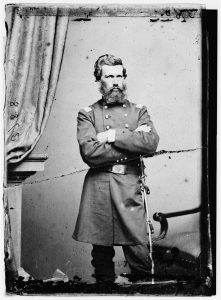“It was a Warm Place Indeed”: O.O. Howard’s First Impressions of Bull Run
Three days after the Federal defeat at Bull Run, Col. Oliver Otis Howard sat down to write a letter to his wife Lizzie. The Maine native, like so many others, had just seen the first substantial combat of his life, a swirling chaotic battle that had resulted in just shy of 5,000 combined casualties.

Howard’s brigade of fours regiments played an active role in the battle’s closing actions, attacking into the strong Confederate defenses before being repulsed along Chinn Ridge. During the hot day, many of Howard’s men, ordered to the front at the double-quick, had fallen out of line and would not rejoin their regiments for days to come. In the letter that follows, Howard discusses the battle, the retreat, and the reorganization of the demoralized Federal army back near Washington, D.C.
City Hotel Alexandria Va
July 24th 1861
My dearest wife
On my arrival after our wearisome retreat at this place I was cheered by an affectionate letter from you enclosing one from my poor friend Mrs. Greble. [1] Since then I have been hard at work organizing, feeding & quartering troops.
Our battle was planned so as to break God’s holy day. Charlie [2] & I were under fire & know what it is to hear balls whistle. My horse had a ball put thro his [gambrel] & is very lame. After we had reached Fairfax C.H. somebody stole him from me, but I recovered him.
The battle was about ten miles beyond Centreville by the road we took. We were halted by Gen McDowell some six or seven miles this side of the field, & then were ordered to hasten on, & when about half way the order came to move at double quick, which we tried to do under a hot sun. The men were many of them exhausted when we came into sight of the battle. We passed the wounded for a while before we got into the open plain. We then marched about a mile under fire from heavy guns, formed two lines, one of the 2nd Vt. Regt Col Whiting & the 4th Maine – Col. Berry. The other of the 3d & 5th Maine. I marched up the first line & got them well at work & then returned to the valley below for the other line. I brought that up also. We ascended a hill through a piece of brush wood and then emerged into an open space and it was a warm place indeed. A battery on our right & another on our left were pouring the shot upon us & the musketry from the front.
I felt in no way unpleasant on the field. I kept sending Chas. Off on duty. No balls touched any of us. Mordecdai [3] & Lt Buel [4] were much exposed but a Good Providence or rather a Good Lord protected us. We retreated when ordered to do so at a walk, but all the troops were mixed up – till we got to Centreville. Then we organized & marched back after an hour’s sleep to Fairfax Court House – slept till daylight on the ground & then retired in order to Clermont. The cars came to take the troops to town – where I got quarters for them & here we are, all but my own Regiment [5] which I sent to Clermont yesterday. I am going out there tonight. Much love to the children. I shall write Guy [6] just as soon as I can. Keep up a good heart darling. We have met with a sad reverse. Our baggage nearly all cut off. I lost all my papers some clothes & your miniature.
Aff. Your husband Otis [7]
____________________________________________________________
[1] Sarah Greble was the widow of Lt. John Greble, who had been killed at the battle of Big Bethel on June 10, 1861. Lieutenant Greble was one of Howard’s closest friends before the war, and Howard acted as godfather to Greble’s daughter, Clara.
[2] Charles Howard, O.O’s younger brother.
[3] Lieutenant Alfred Mordecai, Jr., (West Point, Class of June 1861) served as Howard’s Assistant Adjutant General from July-August 1861.
[4] Lieutenant David Buel (West Point, Class of June 1861) served as an aide to Howard until early August 1861.
[5] Howard commanded the 3rd Maine Infantry before he was promoted to brigadier general.
[6] Guy Howard, O.O.’s six-year-old son.
[7] Howard Papers, Bowdoin College, Series 2, Box 2, Folder 27.
Is it OK if I use this transcription on my site (with attribution, of course)?
Hey Harry, feel free. The Howard Papers don’t have any restrictions on their use.
A superb article!
thanks Ryan — this is yet another little jewel from ECW … i note the distinction that the religious Howard made between “Good Providence” (the will of God) and the Good Lord (the deity) in protecting him and his staff during the battle … and i learned that he went by Otis, not Oliver, to his wife. thanks again, you picked a winner.
Hey Mark, thanks for the comment. Howard going by “Otis” to his friends and family goes all the way back to his childhood. And it continued throughout his entire life, in fact.